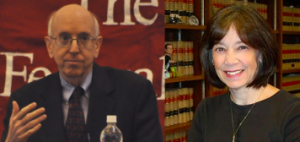The Seventh Circuit's War With Judge Posner Really Escalated Quickly
I mean, this really got out of hand fast.

Posner v. Wood: game on.
In the aftermath of the Seventh Circuit’s decision to write a pointed benchslap criticizing Judge Posner for his handling of a pro se defendant’s criminal trial, perhaps it’s time we take stock of where we are in the conflict between former Judge Richard Posner and his old Seventh Circuit colleagues.
First, the outspoken jurist walked away from the court, calling out their views on pro se litigants as his motivation. Soon after, we all got a chance to read his latest book (affiliate link), where he sharply criticized, primarily, the handling of pro se litigants by staff attorney offices.

Is The Future Of Law Distributed? Lessons From The Tech Adoption Curve
Chief Judge Diane Wood disputed Judge Posner’s allegations and defended the quality of the circuit’s staff attorneys. But this dispute stepped up a notch over Judge Posner’s decision to publish a number of internal memoranda to make his point about staff attorney reform. We learned that the Chief Judge took her objections to the book’s use of internal documents all the way to the Codes of Conduct Committee of the Judicial Conference. It turns out, that committee issued an advisory opinion siding with the Chief Judge:
As a threshold matter, the Committee concludes easily that the anticipated public disclosure of the confidential, internal court communications, about which you inquire, would violate the intent, letter, and spirit of the Code.
But Judge Posner pointed to the word “advisory” and went forward with his day. Even though the opinion was issued confidentially, Chief Judge Wood has opted to make it public. Another salvo in this clash.
And the opinion isn’t very kind to Judge Posner. That said, it does seem to be a stretch. The committee focuses on Canon 4D of the Code of Conduct for United States Judges, stating that “[a] judge should not disclose or use nonpublic information acquired in a judicial capacity for any purpose unrelated to the judge’s official duties.” The committee decides to throw another dig into a footnote:
Sponsored

Legal AI: 3 Steps Law Firms Should Take Now

Is The Future Of Law Distributed? Lessons From The Tech Adoption Curve

Navigating Financial Success by Avoiding Common Pitfalls and Maximizing Firm Performance

Early Adopters Of Legal AI Gaining Competitive Edge In Marketplace
The Committee has effectively had no prior occasion to opine on conduct implicating Canon 4D(5). Candidly, the lack of opinions is likely reflective of the truth that Canon 4D(5)’s proscription is abundantly clear and, thus, no other judge has ever sought guidance from the Committee as to whether such disclosure of nonpublic information is ethically acceptable.
Balderdash. This prohibition is about judges blackmailing people, not judges discussing staff attorney memos long after a decision is rendered. It’s possible to object to this book on a lot of levels — for example, the opinion cites the public lack of respect shown for staff as potentially undermining morale, which is a valid concern for court administration — without trying to morph this into Canon 4D.
Seriously, what’s in the water in Chicago these days? We’ve got tell-all books, retirements, benchslaps, ethics opinions… everybody just needs to settle down over there.
Read the whole memo and letter on the next page…
Earlier: Circuit Agrees With Judge Posner On Treating Pro Se Litigants Better… By Benchslapping Judge Posner
The Seventh Circuit Responds To Judge Richard Posner
Sponsored

The Business Case For AI At Your Law Firm


Early Adopters Of Legal AI Gaining Competitive Edge In Marketplace
 Joe Patrice is an editor at Above the Law and co-host of Thinking Like A Lawyer. Feel free to email any tips, questions, or comments. Follow him on Twitter if you’re interested in law, politics, and a healthy dose of college sports news.
Joe Patrice is an editor at Above the Law and co-host of Thinking Like A Lawyer. Feel free to email any tips, questions, or comments. Follow him on Twitter if you’re interested in law, politics, and a healthy dose of college sports news.







